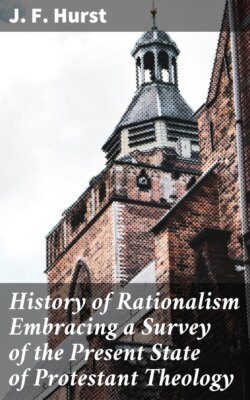Читать книгу History of Rationalism Embracing a Survey of the Present State of Protestant Theology - J. F. Hurst - Страница 3
На сайте Литреса книга снята с продажи.
PREFACE.
ОглавлениеTable of Contents
There were no prefatory remarks to the first and second editions of the following work. It was thought, when the printer made his final call for copy, that a preface might be written with more propriety if the public should indicate sufficient interest in the book to make its improvement and enlargement necessary. That interest, owing to the theme rather than the treatment, has not been withheld. The investigation of the subject was pursued in the midst of varied and pressing pastoral duties, with a pleasure which no reader of the result of the labor can enjoy; for, first, the author felt that Rationalism was soon to be the chief topic of theological inquiry in the Anglo-Saxon lands; and, second, he regarded the doubt, not less than the faith, of his fellow men as entitled to far more respect and patient investigation than it had usually received at the hands of orthodox inquirers.
The author would probably never have studied the genetic development of Rationalism in Germany, and its varied forms in other countries, if he had not been a personal witness to the ruin it had wrought in the land of Luther, Spener, and Zinzendorf. In compliance with the instruction of a trusted medical adviser, he sailed for Germany in the summer of 1856, as a final resort for relief from serious pulmonary disease. But, through the mercy of God, he regained health so rapidly that he was enabled to matriculate in the University of Halle in the following autumn, and to be a daily attendant upon the lectures of such men as Tholuck, Julius Müller, Jacobi, and Roediger. From some theologians he heard Rationalism defended with an energy worthy of Wolff and Semler; from others with a devotion worthy of the beloved Neander. In the railroad car, the stage, the counting-room, the workshop, the parlor, and the peasant-hut, Rationalism was found still lingering with a strong, though relaxing grasp. The evangelical churches were attended by only a few listless hearers. His prayer to God was, "May the American Church never be reduced to this sad fate." The history of that movement, resulting in such actual disaster to some lands and threatened ruin to others, took a deep hold upon his mind; and if he has failed in any respect to trace it with an impartial pen, his hope is that his failure will not cause any bright color of the truth to be obscured for a moment. For no man and no cause can ultimately triumph by giving an undue prominence to favorite party or principles; it is only by justice to all that the truth can win its unfading laurels.
Criticism was to have been expected, from the very nature of the topic of investigation. But the author has endeavored, as a student at the feet of his judges, to derive the largest possible benefit from criticism. No word of censure, however wide of the mark, has been unwelcome to him, whether from the sceptical or orthodox press. To all questioned passages he has given a careful re-examination, in some instances finding cause for alteration, but in others seeing his ground more strongly sustained than was at first imagined. He has, for example, been informed by many esteemed persons that his representation of Coleridge was hardly just; and, in obedience to that suggestion, he has given that author's works a more careful study than ever, having previously resolved to completely reverse his judgment of that profound thinker's faith, if he found his own utterances would justify him in that course. The result was, as far as he can now recall, that he could alter but one adjective in the entire section relating to Coleridge. Of course, the author finds no fault with those who differ from him on Coleridge, or on any other writer who has come under treatment; but he must be granted by others what he concedes to them. For the criticism, as a whole, which he has received both through the press and private sources, he owes a debt of gratitude which he cannot hope to pay. It gives him profound pleasure to know, that the highest theological journals in the United States which wage open war against orthodoxy, have conceded, with marked unanimity, the general correctness of his statements, though they naturally take issue with his conclusions.
Every effort has been bestowed on the present edition to make it as free from blemishes as possible. The appendix of literature has been slightly enlarged, many typographical errors—occurring in consequence of the too rapid passage of the work through the press, and the abundance of words of different languages with which the printer was not always well acquainted—have disappeared; and, in many cases, the narrative has been brought down to the present time. In the prosecution of revision, a large number of the stereotype plates have been cancelled; and no labor has been wanting to make this edition worthy of the goodwill expressed toward the two editions which have preceded it.
Through a strange providence the author is now about to commence a term of theological instruction in Germany, where Rationalism first excited his attention, and where his apprehensions were first raised that Great Britain and the United States might be seriously invaded by it. His presence at its old hearthstone leads him to indulge the hope that, in some future though distant day, if life be spared, he may be able to enlarge this history greatly, and thus to render it better adapted to its purpose, more approximative to his first ideal, and more commensurate with the present universal interest in religious and theological themes.
Bremen, Germany, November 5, 1866.
